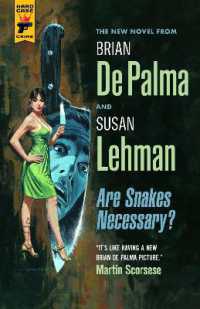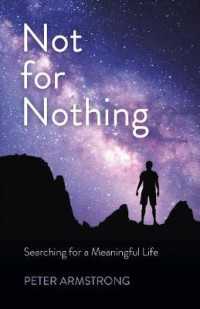- ホーム
- > 洋書
- > 英文書
- > History / World
Full Description
Patrimonio antes del patrimonio presents a critical reflection on the concept of cultural heritage and its association with archaeological practice in Mexico during the nineteenth century. The study asks what were the historical circumstances that facilitated the development of a set of uniquely conceived relationships between emerging comprehensions of Mexican antiquity and a nascent scientific discipline in these contexts? To address this query, three key processes are considered: the foundation and institutionalization of the incipient Mexican nation-state; the formation of new visual and semantic conceptions surrounding the material objects of the past; and the development of academic fields for their study.
'Patrimonialist thought' is proposed as a category for the analysis. This elucidates two fundamental transformations, derived from Enlightenment-era thinking, surrounding the conception of the antiquities and monuments of the past: first, the generation and consolidation of novel linguistic frameworks, values, and methods to mediate the study of such objects; and second, the constitution of bases that legitimized the physical and ideological appropriation of the national - and pre-Hispanic - past by diverse social actors and groups. This perspective permits a deeper appreciation of the historical contexts that allowed individuals and institutions to produce and reproduce both conceptual categories and knowledge linked to Mexican history, both in the burgeoning nation and in other centres of power and influence.
This book critically confronts the "natural" discourses - focused on the monumentalization of characters, names, things, and places - that make up the 'official history' of the relationship between Mexican archaeological practice and cultural heritage. Este volumen presenta una reflexión crítica sobre el concepto de patrimonio cultural y su asociación con la práctica arqueológica en México durante el siglo XIX. La pregunta central que aborda es: ¿cuáles fueron condiciones históricas que posibilitaron el desarrollo de un conjunto de relaciones particulares entre las comprensiones emergentes de la antigüedad mexicana y una incipiente disciplina científica en este contexto? Para responder a esta interrogante, se consideran tres procesos clave: la fundación e institucionalización del incipiente Estado-nación mexicano; la formación de nuevas concepciones visuales y semánticas en torno a los objetos materiales del pasado y el desarrollo de campos académicos para su estudio.
Se propone como categoría analítica el "pensamiento patrimonialista". Este dilucida dos transformaciones fundamentales, derivadas del pensamiento de la Ilustración, en torno a la concepción de las antigüedades y monumentos del pasado: primero, la generación y consolidación de nuevos marcos lingüísticos, valores y métodos para mediar su estudio; y segundo, la constitución de bases que legitimaron la apropiación física e ideológica del pasado nacional —y prehispánico— por parte de diversos actores y grupos. Esta perspectiva muestra una apreciación más profunda de los contextos históricos que permitieron a individuos e instituciones producir y reproducir categorías conceptuales y conocimientos vinculados a la historia mexicana, desde la reciente nación como en otros centros de poder e influencia.
Este libro confronta críticamente los discursos "naturales" —centrados en la monumentalización de personajes, nombres, cosas y lugares— que conforman la "historia oficial" de la relación entre la práctica arqueológica mexicana y el patrimonio cultural.
Contents
CAPÍTULO INTRODUCTORIO
FIN DE SIGLO: LAS EXPERIENCIAS A DEBATE
ANTIGÜEDADES Y MONUMENTOS EN LOS CONFINES DE LA NUEVA ESPAÑA (1780-1820)
DE ANTIGÜEDADES MEXICANAS A MONUMENTOS DEL MÉXICO ANTIGUO (1821-1870)
PASADO Y PRESENTE EN EXHIBICIÓN: MONUMENTOS PARA LA HISTORIA PATRIA (1880-1910)
CONCLUSIONES, UNA SÍNTESIS Y UN COLOFÓN
APÉNDICE BIOGRÁFICO
BIBLIOGRAFÍA








